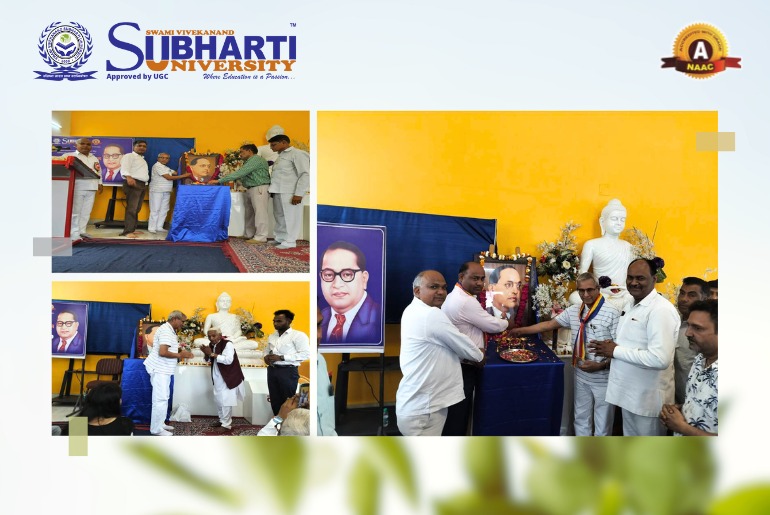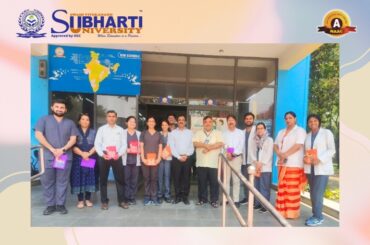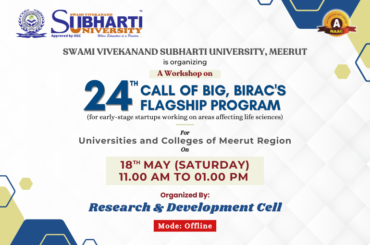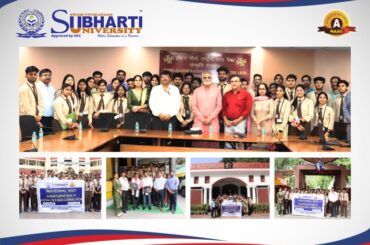“Celebration of Dr. B.R. Ambedkar Jayanti on 14 April, 2024” Panchsheel Par Paricharcha
On the Occasion of the 133th Birth Anniversary of Dr. B.R. Ambedkar, “Panchsheel par Paricharcha” was organized by Sangha Mata Dr. Mukti Global Buddhist Foundation in collaboration with Dr. Ambedkar Chair, SVSU, Meerut on 14 April, 2024 at 10.00 AM.
During Panchsheel par Paricharcha, Dr. Manoj Kumar Tripathi said that there are many sects of Buddhism and there are different kinds of Buddhist monks all over the world. The life and customs of Buddhist monks are not only different and unique but consist of a spiritual meaning. Their daily life follows a strict schedule that revolves around meditation, study of scriptures, and taking part in ceremonies. There are Buddhist shrines, Buddhist monasteries, where monks live, Gompas and Buddhist Stupas all over the world. Though it originated in northern India, the Emperor Ashoka helped to spread Buddhism into Southeast Asian countries such as Sri Lanka, Myanmar, Thailand and Indo-China, from where it moved on to influence people in the Himalayan kingdoms of Sikkim, Bhutan, Nepal, Tibet, Mongolia, Central Asia as well as China, Korea, VietNam and Japan. Around 95 per cent of the population in Thailand is Buddhist, the highest concentration in the world, with Cambodia, Myanmar, Bhutan, Sri Lanka, Tibet, Lao People’s Democratic Republic, Viet Nam, Japan, Macao (China) and Taiwan Province of China following close behind.
Mr.Raj Kumar Sagar said that the day of October 14, 1956 was clearly an important moment in history. On this day, B R Ambedkar along with 365,000 of his Dalit followers decided to exit the folds of Hinduism and embraced Buddhism. Ambedkar’s conversion to Buddhism marked a moment when Dalits in the country got a new impetus and a voice that was hitherto constrained by the four-fold varna system dominating Hinduism. Ambedkar had long been frustrated by the basic tenets of Hinduism, and considered the inherent characteristics of the religion, particularly the caste system, to be a bigger threat to freedom in Indian society than that of the British. Unlike Mahatma Gandhi, who considered the internal reform of the caste system to be the way forward, Ambedkar believed that the only way the Dalits could find a place for themselves in Indian society was by way of conversion. All the religions of the world are based on the fundamental principles of good conduct and prohibit their followers from indulging in the misconduct and misbehavior that may harm the society at large. So, the Panchshila of Buddha is comprised of the basic teachings of conduct which are as no killing means respect for life, no stealing means respect for others’ property, no sexual misconduct means respect for our pure nature, no lying means respect for honesty and no intoxicants means respect for a clear mind.
Dr. Atul Krishna, Founder of Swami Vivekanand Subharti University congratulated the 133th Birth Anniversary of Dr. B.R. Ambedkar to all the people of India. He highlighted the teaching of Dr. B.R. Ambedkar which is very important for social reforms. He said that we should adopt the teaching of Dr.B.R. Ambedkar about casteless society. It will be a real and true tribute to Dr. B.R. Ambedkar.







